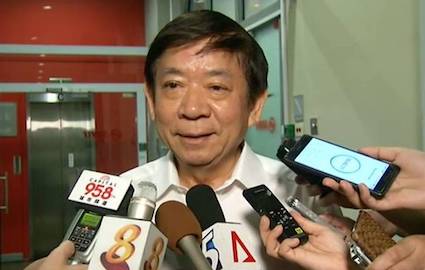Singapore extends its own port limits and says it will act firmly if Malaysian vessels continue to intrude

(Straits Times) – Singapore extended its own port limits in response to intrusions by Malaysian vessels into its waters and also sent out a strong warning: While the Republic has so far responded with restraint against aggressive actions by Malaysian government vessels in its waters, it will not hesitate to act firmly to protect its territory and sovereignty, if necessary.
Transport Minister Khaw Boon Wan said this on Thursday (Dec 6), calling on Malaysian government vessels to “cease their intrusions and return to the status quo before 25 Oct 2018”.
On Oct 25 this year, Malaysia issued a federal government declaration that would extend the Johor Baru Port limits into Singapore’s territorial waters.
Since then, there have been 14 intrusions by Malaysian vessels into Singapore’s waters, Mr Khaw said. He said three such vessels were still in Singapore’s waters as he spoke.
Singapore had also decided to expand its own port limits in response to Malaysia’s action, he said, but only within its own area.
“Our security agencies will continue to patrol the area, and respond to unauthorised activities on the ground. They have so far responded with restraint against aggressive actions by the Malaysian Government vessels,” said Mr Khaw.
“But Singapore cannot allow our sovereignty to be violated, or new facts on the ground to be created. Therefore, if it becomes necessary, we will not hesitate to take firm actions against intrusions and unauthorised activities in our waters to protect our territory and sovereignty.”
Mr Khaw noted that since at least 1999, Singapore has been exercising its jurisdiction in the waters now covered by the recent extension of the Johor Baru Port limits.
“Malaysia has never laid claim to these waters, or protested our actions there. Now, out of the blue, Malaysia is claiming these territorial waters that belong to Singapore,” he said.
“Without any prior consultations, Malaysia is seeking to alter unilaterally the longstanding status quo in the area. This is a blatant provocation and a serious violation of our sovereignty and international law.”
On Nov 5, Singapore issued a Third Person Note (TPN) requesting that Malaysia immediately amend the declaration to reflect the sovereignty of Singapore over these waters, and on Nov 9, Mr Khaw said he raised this issue with his counterpart, Malaysian Transport Minister Anthony Loke, in Bangkok.
However, Malaysia went ahead to publish a circular and a notice notifying the shipping community of the expanded Johor Baru Port limits, Mr Khaw said.
Singapore then issued a second TPN on Nov 29 to protest against these documents.
“Malaysian government vessels have since been continually intruding into Singapore territorial waters off Tuas,” Mr Khaw said.
“So far there have been 14 intrusions. Singapore had protested the repeated intrusions via three TPNs.”
On Wednesday, Malaysia issued a media statement arguing that Singapore cannot claim the area as its territorial waters on the basis of its reclamation works in Tuas in recent years.
But Mr Khaw argued: “In 1979, when Malaysia published its map, it did not consult Singapore before drawing its territorial claim line. In fact, in 1979 no reclamation at Tuas had taken place.
“So the Malaysian unilateral territorial claim of 1979 (which we do not recognise) could not possibly have taken into account any reclamation by Singapore.”
The new Johor Baru Port limits extend beyond Malaysia’s own territorial claim line, and Malaysian ships have crossed this line to enter Singapore waters, Mr Khaw added.


Malaysia also replied to Singapore’s first TPN, that was issued on Nov 5, on Wednesday, he said.
In its reply, Malaysia disagreed that the altered Johor Port limits had encroached on Singapore territorial waters off Tuas, and emphasised that the Malaysian government vessels were patrolling the territorial waters of Malaysia.
“Malaysia’s reply also proposed that officials from the two sides meet to work towards an amicable resolution. Singapore naturally agrees to this and will follow up,” Mr Khaw said.
He added: “Countries do amend their port limits from time to time. But they must do so in a way that does not contravene international law, or infringe on the sovereignty of another country.”
Singapore has amended its port limits before, with the last time being in 1997, he said.
In view of these recent “provocative developments”, Singapore has decided to extend the Singapore Port Limits off Tuas, with effect from Thursday, Mr Khaw said.
“This violation of Singapore’s sovereignty is a serious new issue in our bilateral relations with Malaysia,” he added.
“Nevertheless, I remain optimistic. We still seek good bilateral relations, and hope we can work together to find an amicable solution to these issues.”
But Singaporeans have to be fully aware of these developments, he said.
“While we seek cooperation and friendship with other countries, we must never let other countries take advantage of us. When our national interests are challenged, we have to quietly but firmly stand our ground and stay united as one people.”

